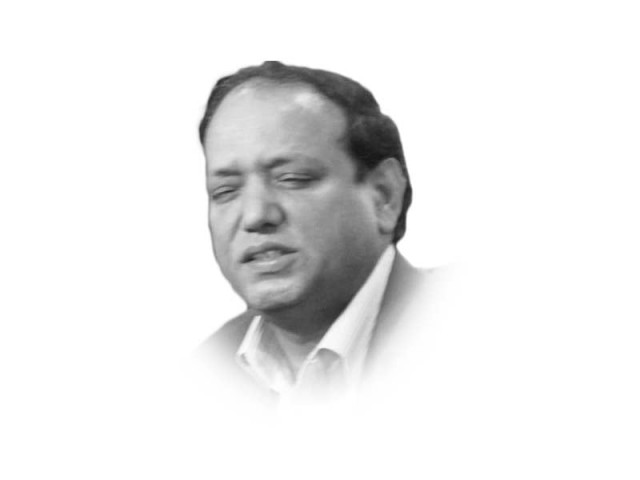Institutionalised degradation of the blind
Let us examine how we are protecting and promoting rights of this highly vulnerable segment of society

The writer is programme manager at CPDI. He tweets @XahidAbdullah
It is about time we call the treatment of the blind like it is — institutionalised degradation of blind Pakistanis on a daily basis — yes, it happens. Though the blind have to face discrimination in almost all spheres of life, they have to face institutionalised degradation in educational institutions, banks and at the job market. While the concept of ‘reasonable accommodations’ has become part of legislation to protect and promote rights of the disabled in many countries under which access barriers are removed to provide equal opportunity environment without lowering the standards to accommodate the disabled, educational institutions, banks and employers do not provide support mechanisms to the disabled in the country. Forget about providing books to the blind in accessible formats, educational institutions do not have support mechanisms in place to help the blind students when they appear in exams. A blind student is supposed to arrange writer for herself or himself and the writer is supposed to be a grade lower than the one in which the student is appearing for the exam. I have experienced it myself and have been a witness to many disappointments and humiliations that the blind male and female students have to face in arranging writers for themselves. Aqil Sajjad lost his sight when he was doing his matriculation and could not continue studying science here. Two years ago, he completed his Ph.D in Physics from Howard University. Aqil Sajjad could accomplish this because Oregon State University and Howard university provided him an equal opportunity environment, provided him books in accessible formats and allowed him to take computer based exams with his software and provided him writers. No school, college or university in Pakistan provides this kind of support to the blind students.
The other example of institutionalised degradation is the way banks treat the blind when they try to open up bank accounts with their hard earned money. The attitude of the banks is absolutely disgusting. They tell the blind point blank that they cannot open individual accounts and that they can only open up joint accounts because they happen to be blind. This is despite the notification of the State Bank of Pakistan instructing the banks to facilitate the blind customers in opening up bank accounts and to provide them related services. Ask any blind person and she or he will tell you the humiliation they have to face when they go to these banks for their financial services.
The genesis of this institutionalised degradation can be found in the stigma attached with disability. Our society is ashamed of the disabled people. Families hide their disabled and condemn them to live a life of isolation. As a result, the 1998 census puts the number of disabled people merely at 2.49 per cent of the total population. Disabled people’s organisations argue the number of disabled persons is around 10 per cent of the total population. Why would you acknowledge the right to life of dignity of people whose large majority is officially non-existent. It does not make political sense for the ruling elite to spend resources on the disabled. It does not because these disabled people, wretched of the earth, are voiceless and unaccounted for. Why should ruling elite spend resources on a segment of population which is scattered and does not have vote power? So, the ruling elite does not spend resources on the disabled because it does not translate into political dividends.
It makes political sense to sign and ratify UN disability convention. It does not cost you a penny and makes you look good in the comity of nations. So, the ruling elite has signed and ratified this convention.
Let me use the cliche here and say that the worth of signing UN disability convention and enacting laws like Sindh Differently Abled Persons (Employment, Rehabilitation and Welfare) Act 2014 is as much as the papers this convention and the law are written on. The Sindh disability law, modelled on the draft developed by World Health Organisation, (WHO) and which is under consideration of federal government and other provinces contains all the right jargon but will largely remain ceremonious if not improved. Among other problems, WHO proposed draft disability bill lacks enforcement mechanism and if adopted by federal and other provincial government will not protect and promote rights of the disabled.
The ruling elite needs to get real and catch up with the world.The era of ‘fooling us by calling us differently abled’ and ‘special people’ is long gone, call us ‘disabled people’ or persons with disabilities as is the case in UN Convention on Rights of Persons with Disabilities but give the disabled their rights. Creating an environment in which disabled people can live a life of dignity requires resources. What the disabled people want is not charity but the due share in the national resources to protect their rights which is only possible through legislation that has enforcement mechanisms to protect and promote our rights.
Published in The Express Tribune, November 19th, 2016.
Like Opinion & Editorial on Facebook, follow @ETOpEd on Twitter to receive all updates on all our daily pieces.















COMMENTS
Comments are moderated and generally will be posted if they are on-topic and not abusive.
For more information, please see our Comments FAQ